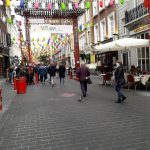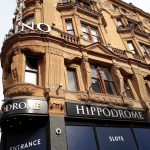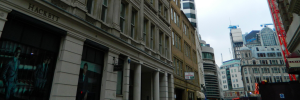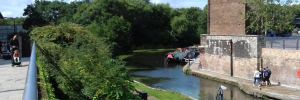Karl Marx’s life in Soho was marked by hardship and intellectual achievement. As a German Jew living in exile, he struggled to make ends meet, and his cramped living conditions in Dean Street reflected his financial difficulties. Yet despite these challenges, Marx wrote some of his most influential works during his time in Soho.
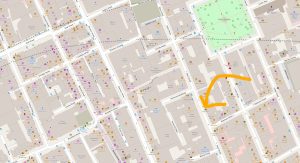
Marx’s arrival in Soho was part of a larger wave of immigration that transformed the area from an aristocratic suburb into a diverse and vibrant community.
It has been fashionable to bring out the softer side of this crusty member of the left-wing establishment, – the Bridge Theatre 2017 comedy ‘Young Marx’ focuses on Marx as he was in 1850: a 32-year-old German Jew living there in exile in straightened, circumstance with his wife and helpmate Jenny, their children and maid.
Cramped Living Conditions
They lived in 2 rooms, a bedroom at the back and a living kitchen in the front, at 28 Dean Street, Soho, now the famous Quo Vadis restaurant, they had five children, living here, and three of them died at Dean Street.
As the Guardian review of the play said: ‘he (Marx) was hounded by creditors, harried by the police and at odds with many of his fellow revolutionaries’, and he survived largely with the help of his friend Friedrich Engels. So, what was so special about Marx, and how did he illustrate the ways of the new incomers to Soho?
The French Huguenots who settled in the area in the late 17th century were followed by waves of immigrants who brought their own unique cultures and perspectives to the neighbourhood. Marx and his family were part of this ongoing transformation, bringing their intellectual and political ideas to the area.
One of Marx’s most important works, “Das Kapital,” was written during his time in Soho. The book, which explored the relationship between labour and capital, became a cornerstone of Marxist theory and profoundly impacted the world of economics and politics. Marx’s ideas continue to be influential today, and his legacy is still felt in the world of politics and intellectual thought.
Marx’s life in Soho was not without its difficulties. He constantly struggled with creditors and was at odds with many of his fellow revolutionaries. He was also under close surveillance by Prussian spies interested in his ideas and activities. Despite these challenges, Marx could continue writing and thinking, and his ideas profoundly impacted the world of political and economic thought.
Karl Marx was closely followed by Prussian spies who sent regular reports of their life in Dean Street to the Prussian Minster of the Interior. One wrote: ‘Marx lives in one of the cheapest quarters in London. Everything is broken, tattered and torn. The Marx family had come here via Chelsea, having been evicted by bailiffs- then to a hotel in Leicester Square and a Jewish lace dealer before ending up in Dean Street. Marx had a prosperous Jewish background, and Jenny’s father had recently been ennobled.
Marx’s life in Soho was a testament to the power of immigrants to transform a community and to the enduring impact of intellectual ideas. His struggles and achievements in the area are just one example of the ways in which Soho has been shaped by the people who have lived there over the years.
Soho Community
Marx’s presence in Soho was wider than his ideas and writing. He was an active community member, participating in political and social events and engaging with other residents. His friend Friedrich Engels, who lived in Manchester, was also a regular visitor to Soho and contributed to the intellectual and political debates of the area.
Despite the challenges of living in a small and cramped space, Marx and his family managed to create a home for themselves in Soho. They were part of a larger community of immigrants and intellectuals who shared their struggles and aspirations. Soho was a place where people from different backgrounds and walks of life could unite and create something new and exciting.
Marx’s life in Soho ended in 1856 when he and his family moved to Hampstead. However, his legacy and the ideas he developed during his time in Soho continue to resonate today. His neighbourhood may have changed over the years, but its spirit of creativity, diversity and intellectual curiosity has endured.
Today, Soho is a thriving and dynamic area that attracts people worldwide. Its history as a refuge for immigrants and a centre of artistic and intellectual activity is still evident in its streets and buildings. The legacy of Karl Marx and the other residents who helped shape Soho into what it is today is still felt. Their contributions continue to inspire and inform the community’s ongoing evolution.
Find out about more of these characters and how Soho has changed on my Settling in Soho walking tour


